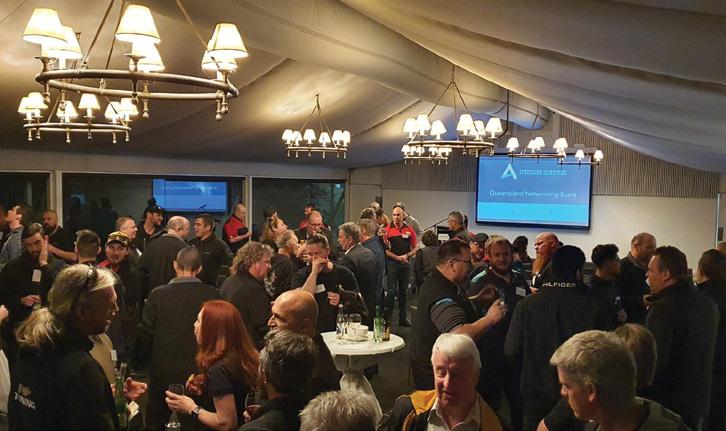NEWS
THINKING A LITTLE DIFFERENTLY ABOUT THE STANDARD EMPLOYMENT OFFER New data is set to inform new approaches as the industry tackles the skills shortage The breaking new data and market intelligence on the experience of over 600 auto apprentices is a fantastic resource that will be put to good use to support a recruitment campaign and to guide employers on how to nurture and keep great talent. The data is going to be very insightful as we run it out – over 60 percent of the fourth year apprentices have considered leaving our industry and one in four female apprentices change their employer during their training years. We clearly have a large gap in finding staff and a big challenge in keeping them. Of course, you already knew that, but the research project was not designed to confirm what you already know – the data also provides much needed answers on what employees love about our industry and what would keep the senior apprentices engaged in our industry for many years to come. We have a big problem, but there is so much more that can be and the research brings ideas for action delivering optimism and hope for our future. We will be talking more about this research project over the remainder of this year, but in the meantime, some interesting intel is already being revealed. As we deliver the data to workshops from Western Australia to Queensland, sharing the top level information to get out some key messages, we are
already hearing of some impressive local initiatives to alleviate the crisis on a workshop to workshop basis. What’s interesting is that as we should have expected, workshops are already engaging in some pretty innovative activities to either recruit or to retain staff. It is very clear that the leading employers already undertake clever options to improve their ability to find and keep staff. For example, a larger number of workshops are using a four-day week – if you ask for a show of hands on a four-day week you can see this trend for improving work life balance and as a retention strategy is more prevalent than we would have expected. This is an option that is more likely to suit larger employers – because of course, the roster works to give everyone a chance to work their five days over four days and Monday and Friday is rostered to make sure that cars can continue to be serviced and repaired. There are also plenty of other initiatives in operation that support employees in new ways – supporting travel during school holidays, providing innovative ongoing training (88 percent of older apprentices believe that they need to keep learning). Another technique that we are seeing is declaring the salary up front in job ads. Many do not feel comfortable doing this, but from the
Lesley Yates, AAAA Director of Government Relations and Advocacy info@aaaa.com.au feedback it is pretty clear that ‘competitive salary’ is not as effective as simply telling a technician what they are likely to earn. The time to fill vacancies for the workshops that actually state the salary upfront in the job ad is generally two to four weeks instead of the expected eight to 12 weeks. The message here is that the data can provide us with real intelligence on how to design a recruitment strategy, it can support employers to have a conversation with employees about their intentions and we can use it to talk to government about changes to policy. But in the meantime, we do need to put into practice new options to recruit and retain and the reality is that we are in a market that is now competing for scarce resources and that means thinking a little differently about the standard employment offer.
QUEENSLAND MEMBERS CELEBRATE At AAAA Networking Event
On Tuesday the 21st of June, the Australian Automotive Aftermarket Association (AAAA) hosted a successful networking evening for Queensland members. Held at the beautiful Victoria Park Golf Club in Brisbane, the member evening took place a few weeks prior to the new Mandatory Data Sharing Legislation becoming law. Over 100 enthusiastic members, spanning the
breadth of the industry, came together to celebrate the new law, network and learn the latest industry updates from the AAAA team. AAAA Chief Executive Officer, Stuart Charity, and AAAA Director of Government Relations and Advocacy, Lesley Yates, joined attendees for the event; while AAAA National Membership Manager, Nigel Bishop, acted as MC. Stuart discussed with the group the new Motor Vehicle Information Scheme becoming law on the 1st of July, and the launch of the Australian Automotive Service and Repair Authority (AASRA). The body will oversee and manage the release of security related information, service and repair information, provide education, follow up any missing information, provide a dispute mediation and resolution service, and recommend improvements as necessary. Lesley discussed the issue of the skills shortage and presented the findings from a recent industry
survey – which was conducted by AADA, MTAQ and AAAA – on this topic, which has made available new data and market intelligence on the experience of more than 600 auto apprentices. She outlined that this survey had highlighted key issues around keeping staff, and in particular thirdand fourth-year apprentices, before explaining that the AAAA is already actioning this data as it looks into fixes for this prevalent problem. The AAAA sends its thanks to all of the members who came and helped its team to celebrate. To see a listing of all upcoming AAAA events, please visit www.aaaa.com.au/upcoming-events Australian Automotive Aftermarket Magazine July 2022
7
























